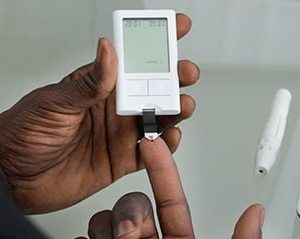- Could Your Grocery Store Meat Be Causing Recurring UTIs?
- Are You Making This Expensive Thermostat Error This Winter?
- Recognizing the Signs of Hypothyroidism
- 10 Strategies to Overcome Insomnia
- Could Artificial Sweeteners Be Aging the Brain Faster?
- Techniques for Soothing Your Nervous System
- Does the Water in Your House Smell Funny? Here’s Why
- Can a Daily Dose of Apple Cider Vinegar Actually Aid Weight Loss?
- 6 Health Beverages That Can Actually Spike Your Blood Sugar
- Treatment Options for Social Anxiety Disorder
Cortisol Might Play Role in Tough-to-Treat Diabetes

The stress hormone cortisol appears to play a role in tough-to-treat type 2 diabetes, a new study finds.
About 1 in 4 people (24%) with tough-to-treat type 2 diabetes have elevated cortisol levels, researchers found.
“These results are significant as they highlight a previously underrecognized factor contributing to the barriers when it comes to managing type 2 diabetes,” said lead researcher Dr. John Buse, from the University of North Carolina School of Medicine Diabetes Center and Translational and Clinical Sciences Institute.
Cortisol is produced by the adrenal glands. The hormone affects nearly every organ and tissue in the body, and plays many important roles in daily function, the Cleveland Clinic says.
Among those roles, cortisol helps regulate blood sugar levels, metabolism, blood pressure and inflammation.
Hypercortisolism — higher-than-normal levels of cortisol — can cause weight gain, high blood pressure, muscle weakness and mood changes, researchers said. All of these problems can further complicate diabetes management.
For this study, researchers screened over 1,000 diabetics whose hemoglobin A1C levels remained high even though they were receiving multiple diabetes therapies.
The researchers found that 24% of the patients had hypercortisolism.
Elevated cortisol levels were even more common in diabetics taking three or more high blood pressure medications, with about one in three suffering from hypercortisolism.
CT scans revealed adrenal abnormalities in about one-third of these patients, with a quarter having an adrenal tumor, researchers said.
This suggests that surgery to address adrenal gland problems could potentially improve diabetes control, researchers said.
Researchers presented their findings at the American Diabetes Association’s annual meeting in Orlando, Fla. Results presented at medical meetings should be considered preliminary until published in a peer-reviewed journal.
“By identifying hypercortisolism in these patients, we can target treatments more effectively and potentially improve their outcomes,” Buse said in a meeting news release.
The study now has moved into a second phase, with researchers evaluating whether bringing cortisol levels down could make diabetes more manageable.
More information
The Cleveland Clinic has more about cortisol.
SOURCE: American Diabetes Association, news release, June 24, 2024
Source: HealthDay
Copyright © 2026 HealthDay. All rights reserved.










